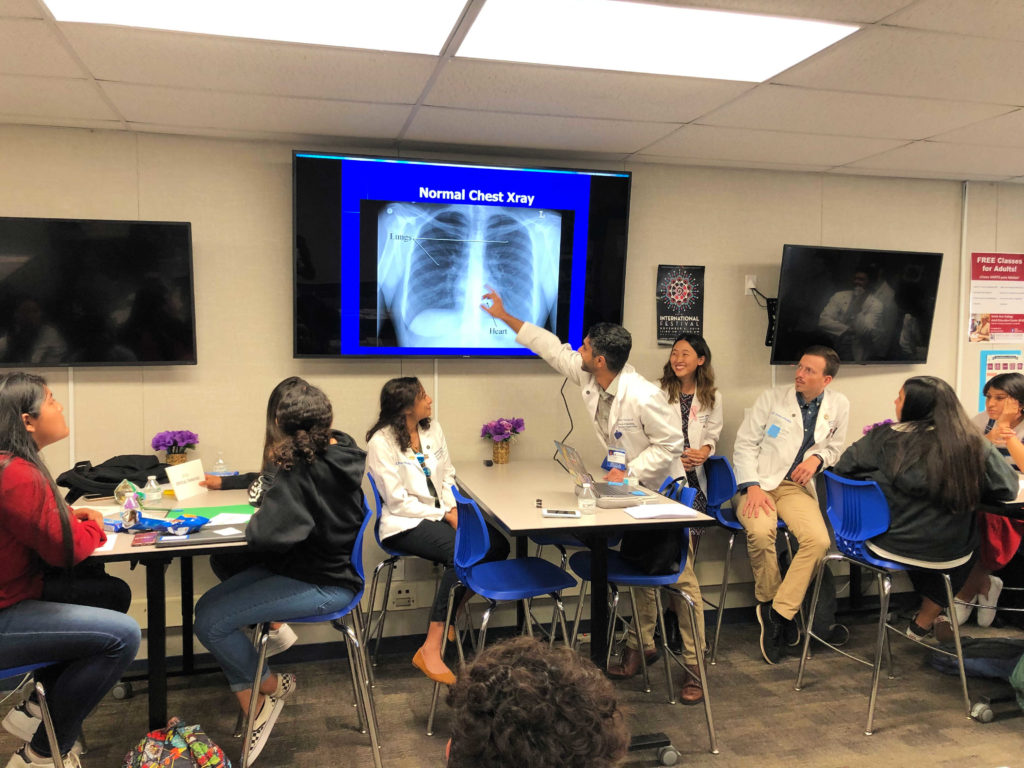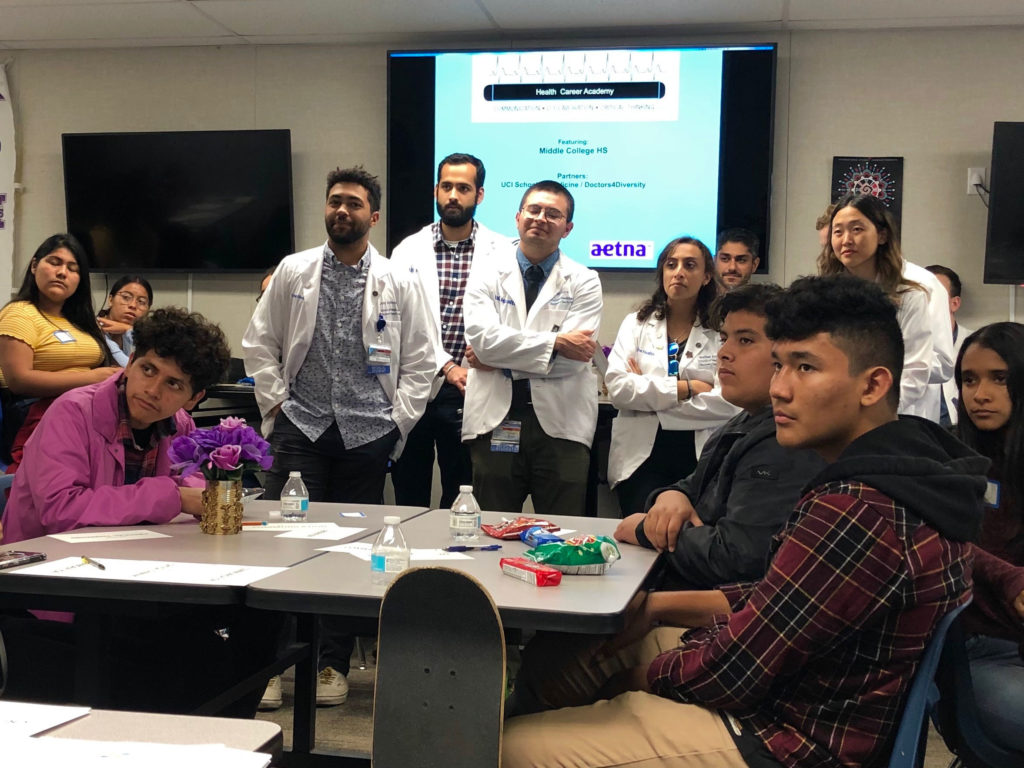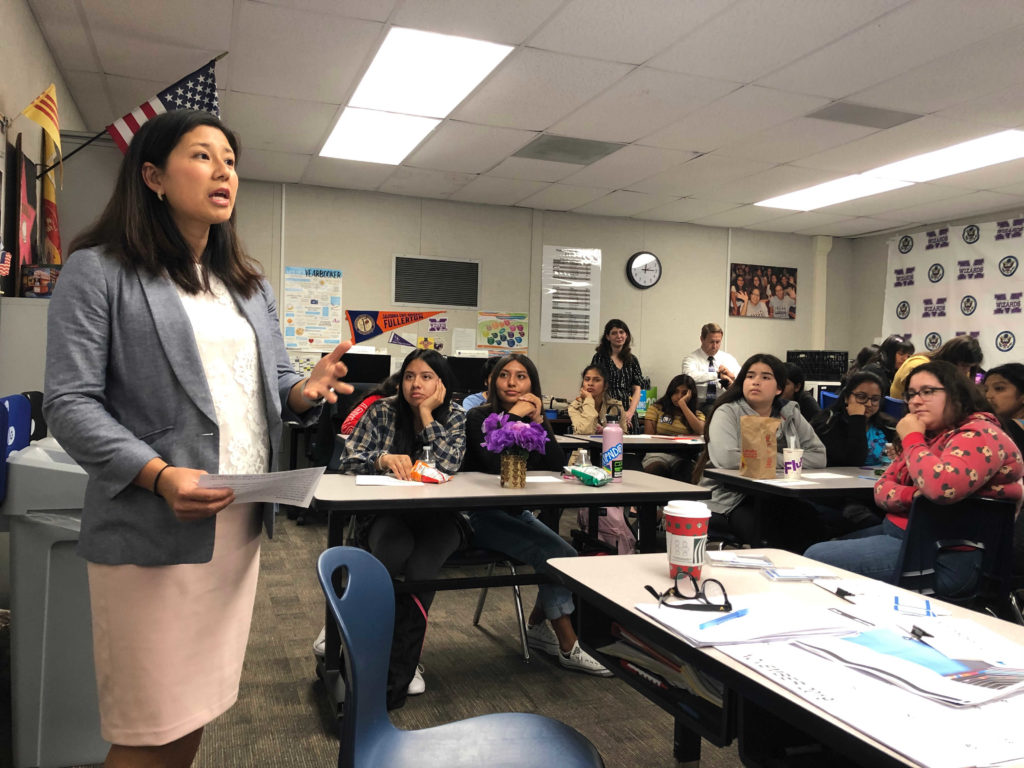It’s a Friday afternoon with a three-day weekend on deck, and about a dozen UCI medical students are gathered in a crowded classroom at Santa Ana’s Middle College High School.
Dressed in bright white lab coats, they take turns outlining introductory medical concepts for more than 30 high schoolers. They break down X-ray images on a flat-screen, analyze the mechanics of the heart, and discuss abdominal anatomy and reproductive systems.

Junior Rebecca Guerrero, 16, is ready for more.
“I really like that this gives us a chance to connect with the med students,” she said. “I can’t wait to see how much more we’re going to be able to do and learn from this program.”
Middle College High School in the Santa Ana Unified School District is known for offering its students college-level opportunities, including dual enrollment at Santa Ana College, where it shares campus space. But this is the first time the school has teamed up with UCI’s School of Medicine to offer a fully sequenced health care curriculum.
It’s part of a national certificate program known as the Health Career Collaborative, and there are only two other partnerships like it in California. The goal is to give students, particularly those whose backgrounds are underrepresented in medicine, a closer look at potential health care careers through interactive workshops, hands-on activities and class trips.
It also gives young people a preview of what it will take to earn advanced medical degrees. And it all started with a phone call.
Building momentum
Four years ago, Middle College High teacher Tamara Storms was teaching a college readiness course for her seniors when she got the idea to connect each student with a professional working in their desired field. A few said they were interested in medicine, but Storms didn’t have any close contacts who were doctors.
“So I called the UCI School of Medicine and started chatting with a counselor,” she said. “The response was positive.”
Storms was put in touch with a UCI outreach group called Doctors for Diversity, or D4D, which works with schools in underserved communities. Around the same time, a group of Middle College students decided they wanted to form a pre-med club.
“We hosted our very first pre-med symposium with Doctors for Diversity, and it was great,” Storms said. “We had 60 students come after school for two hours on a Friday, and the med students ran breakout workshops.”
Keep in mind those 60 students represent about 17 percent of Middle College’s total enrollment.
With momentum building, Doctors for Diversity told Storms about a national program that similarly connects medical students with high school students from backgrounds underrepresented in medicine.
But the Health Career Collaborative went even further. Developed by the American College of Surgeons, it also offered a curriculum to help prepare high schoolers for potential careers and learn about health issues facing their communities.
Stanford and USC had been the only two medical schools in California to participate in the collaborative. UCI became the third by teaming up with Middle College High, where more than 95 percent of the student body identifies as Hispanic or Latino, and more than 74 percent qualify for free or reduced meals.
‘Students didn’t want to leave’
Tania Saba, education manager with the UCI Department of Surgery, said the collaborative uses curriculum that helps students become familiar with basic triage practices and medical terms before they move on to more complex concepts in subsequent years. They can also get a feel for the different kinds of health careers that are out there.

“We can make certain modifications, which we plan on doing by integrating more field trips and more hands-on activities, but the curriculum itself is pre-set so that the certificate is uniform across the country,” Saba said.
The Middle College version was meant to start with 10th- and 11th-graders, who would go deeper in their junior and senior years. But Storms said current seniors didn’t want to be left out.
Suffice to say, interest is strong.
“At the last session, our students didn’t want to leave,” she said. “They just kept wanting to chat up the med students. And when we returned from a field trip we took a couple of weeks ago, we didn’t get back until almost six o’clock, and they were just sort of standing in my room, not leaving.”
The Health Career Collaborative’s third meet-up took place on the Friday before Veterans Day. Presented with X-rays and graphics, students were tasked with identifying the kinds of medical problems ER doctors might see, and they were asked to consider how communication, collaboration and critical thinking are used to care for patients.
They were also greeted by Dr. Theresa Chin, a UCI surgeon who specializes in trauma and critical care. She shared her origin story, which started with a high-school knee injury.
“I needed knee surgery, and that was my first introduction to the world of medicine and healthcare,” Chin said. “I encountered surgeons, sports medicine doctors, nurses, physical therapists, and from that I was like, ‘Oh, this is really cool.’”
Her message was simple: Put in the work, and keep an open mind.
“You never know where things will lead, and you have to take hold of opportunities that come across,” she said.
‘Someone who’s been through it’
Rebecca, the Middle College junior, seems poised to seize those opportunities. Her mother worked at a doctor’s office when she was growing up, and she’s long been interested in helping others.
While she wants to become a surgeon, she hasn’t decided if she’ll specialize in neurosurgery or heart procedures. But she has time to figure all that out, and talking with med students will help.

“I guess I just want to get more knowledge about it so I know more about the fields and what I can go into,” she said. “I want to know more about how much time I need to put in, and how I can get help. I can just ask them what they did, if this happened or that happened, and get feedback from someone who’s been through it.”
That’s the idea, said Christina Cantwell, a second-year med student and co-director of curriculum for Doctors for Diversity.
“We especially love working with the students here because they are so motivated,” Cantwell said. “They stay late, even on Friday afternoons before three-day weekends, and they always want to learn.”
Mark Slader, another UCI med student and program volunteer, graduated from high school in 2012. Now, even as he works to complete his medical school training, he’s seen as a mentor.
“I try to put myself in their shoes,” he said. “There’s definitely a little bit of intimidation at first, but then you can see their interests come out. At this age in high school I was starting to think more about the health field.”
“Something like this would have been awesome because it’s a cool opportunity to see a lot of different things rather than just one part of the health field,” Slader added. “There are a lot of different opportunities for students.”
